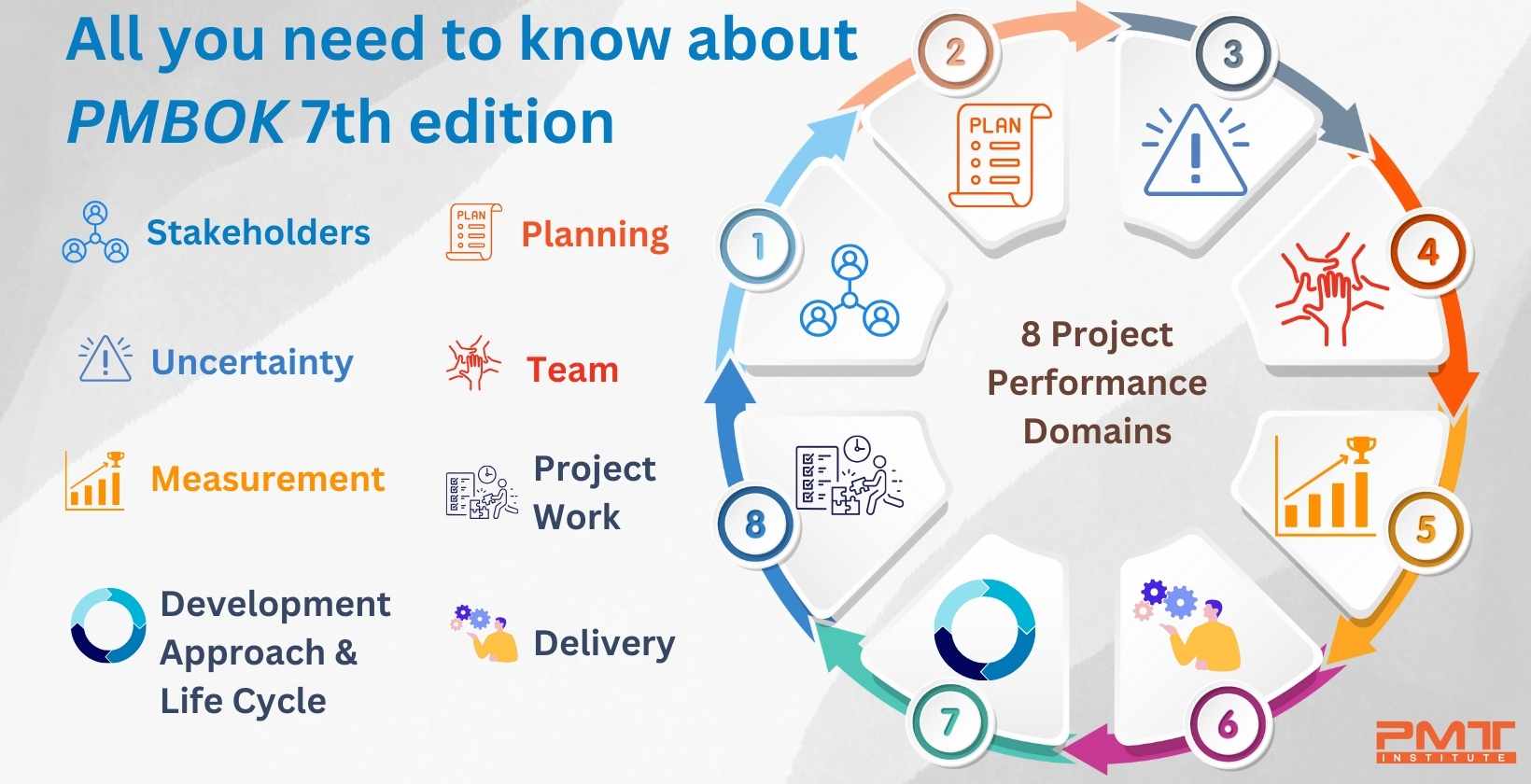PMBOK 7th Edition Guide 2024: Release Date, Latest Version Changes, PMI Knowledge Areas for Project Management (PMP)
Published:
Updated:

In the fast-paced world of project management, the pursuit of excellence and adaptability is an ever-constant quest. The release of the Project Management Body of Knowledge (PMBOK®) 7th Edition by the esteemed Project Management Institute (PMI) has ignited a transformative journey for project management professionals worldwide. Let's explore this highly anticipated guide to navigate the ever-changing landscape of project management.
Guide to Project Management Body of Knowledge (PMBOK) 7th edition
The Guide to Project Management Body of Knowledge (PMBOK) 7th edition has been released, marking a significant milestone for project management professionals. In this article, we will delve into the initial reactions and first impressions of the PMBOK 7th edition, highlighting the changes and features that set it apart from its predecessors.
While the previous post focused on frequently asked questions regarding the PMBOK 7th edition, this blog post aims to provide readers with a comprehensive understanding of the new guide's essence and what to expect. As project management practices continue to evolve, the 7th edition takes a step forward by incorporating modern methodologies, fostering adaptability, and promoting value delivery.
Let's explore the exciting features introduced in the PMBOK 7th edition and delve into how they will shape the future of project management. From principles guiding decision-making to performance domains covering various aspects of project execution, the new guide offers a more flexible and inclusive approach to managing projects.
In the subsequent sections, we will discuss the concept of Value Delivery Systems, the 12 foundational project management principles, the 8 project performance domains, and how tailoring and flexibility play a pivotal role in aligning project management practices with project-specific requirements. Additionally, we will delve into the increased emphasis on agile and hybrid approaches, recognizing their relevance in contemporary project environments.
Moreover, we will explore how the new guide addresses inclusivity, social responsibility, and ethics in project management, considering the impact of projects on diverse stakeholders and the broader community. With a focus on responsible project delivery practices, the PMBOK 7th edition aims to elevate the standard of project management in an ever-changing world.
PMBOK 7th edition presents an exciting and transformative shift in the realm of project management. It provides practitioners with updated tools, methodologies, and principles to succeed in the dynamic landscape of project delivery. As we explore the first impressions of this new standard, it becomes evident that the PMBOK 7th edition sets the stage for more adaptive, inclusive, and value-driven project management practices, shaping the future of the profession.
PMBOK 7th Edition - Gold Standard for Project Management
The PMBOK 7th Edition, as a comprehensive guide for project management, embraces versatility by being applicable to all industry sectors and various project delivery approaches. It comprises two significant components: a robust system for value delivery and a set of 12 fundamental project management principles.
The System for Value Delivery
The System for Value Delivery in the PMBOK 7th Edition encompasses the following essential elements:
Creating Value
This entails understanding and delivering value to stakeholders throughout the entire project lifecycle. Project managers are encouraged to focus on meeting stakeholders' needs and expectations, ensuring that the project aligns with the organization's strategic objectives and delivers tangible benefits.
Organizational Governance System
The PMBOK 7th Edition recognizes the significance of effective governance structures within organizations. It emphasizes the need for clear roles, responsibilities, and decision-making processes to ensure successful project outcomes.
Functions Associated with Projects
Project management involves various functions, such as planning, execution, monitoring, and control. The guide outlines these functions to help project managers navigate through different project phases efficiently.
The Project Environment
Understanding the project environment is crucial for effective project management. The 7th Edition acknowledges the dynamic nature of project contexts and provides tools and insights to adapt project management practices accordingly.
Product Management Considerations
In an increasingly competitive business landscape, considering product management aspects is vital for project success. The PMBOK 7th Edition highlights the importance of aligning project objectives with product management strategies to deliver valuable and marketable products.
By integrating these components, the PMBOK 7th Edition equips project managers with a holistic approach to value delivery. It emphasizes the need to create a conducive environment for successful project execution, ensuring that projects contribute to the organization's growth and overall strategic direction.
Project Management Principles
The PMBOK 7th edition outlines a set of 12 project management principles that serve as guiding principles for project professionals and stakeholders involved in project endeavors.
| No. | Principle | Description |
|---|---|---|
| 1 | Stewardship | Diligent, caring steward of resources. |
| 2 | Team | Foster collaborative project teams. |
| 3 | Stakeholders | Engage effectively with stakeholders. |
| 4 | Value | Focus on delivering value. |
| 5 | Systems Thinking | Recognize and respond to interactions. |
| 6 | Leadership | Demonstrate effective leadership. |
| 7 | Tailoring | Customize practices based on context. |
| 8 | Quality | Build quality into processes. |
| 9 | Complexity | Navigate complex challenges. |
| 10 | Risk | Optimize risk responses. |
| 11 | Adaptability & Resilience | Embrace adaptability. |
| 12 | Change | Enable and manage change effectively. |
These principles are designed to influence and direct the behaviors and actions of individuals throughout the project lifecycle. Let's explore these principles in more detail:
Stewardship
Project professionals are encouraged to act as diligent, respectful, and caring stewards of the project. They must responsibly manage resources and consider the long-term impact of the project on stakeholders and the environment.
Team
Fostering a collaborative project team environment is essential for success. Project managers should promote effective communication, encourage teamwork, and nurture a positive working atmosphere to enhance team performance.
Stakeholders
Effective engagement with stakeholders is crucial to project success. Project professionals must understand and address stakeholders' needs, expectations, and concerns throughout the project's life cycle.
Value
The principle of value highlights the importance of focusing on delivering value to stakeholders. Project managers should ensure that project outcomes align with strategic objectives and provide tangible benefits to stakeholders.
Systems Thinking
Projects are often part of a larger system. Project professionals should recognize, evaluate, and respond to the interactions between the project and its broader context to achieve better outcomes.
Leadership
Demonstrating effective leadership behaviors is vital for guiding project teams towards success. Project managers should inspire and motivate team members while providing clear direction and guidance.
Tailoring
Every project is unique, and project management practices should be tailored based on the project's specific context. Flexibility and adaptability in applying methodologies and processes are essential for tailoring project management practices effectively.
Quality
Building quality into processes and deliverables ensures that the project's final output meets the required standards and satisfies stakeholders' expectations.
Complexity
Projects often involve complexities and uncertainties. Project professionals should be adept at navigating complexity, identifying potential challenges, and implementing suitable strategies to overcome them.
Risk
Optimizing risk responses is critical for project success. Project managers must identify, assess, and address potential risks to minimize their impact on the project.
Adaptability & Resilience
Embracing adaptability and resilience allows project teams to effectively respond to changing circumstances, ensuring that projects remain on track despite uncertainties.
Change
Enabling change to achieve the envisioned future state is fundamental for project success. Project professionals should be receptive to change and capable of managing and implementing transformation effectively.
By adhering to these project management principles, project professionals can enhance their decision-making, project planning, and overall project delivery, resulting in more successful and sustainable project outcomes.
Project Performance Domains
The PMBOK 7th edition introduces eight project performance domains, which represent key areas where project management principles and practices are applied throughout the project lifecycle. These domains encompass various aspects of project execution, providing a comprehensive framework for project professionals to navigate and excel in their project endeavors. Let's explore the eight project performance domains:
Stakeholder Performance
This domain focuses on understanding and effectively managing stakeholders' needs, expectations, and engagement throughout the project. It emphasizes building strong relationships with stakeholders to ensure their support and involvement in project success.
Team Performance Domain
The team performance domain centers around creating and leading high-performing project teams. It involves fostering a collaborative and supportive team environment, encouraging effective communication, and optimizing team productivity.
Development Approach Performance
This domain addresses the selection and implementation of the most suitable project delivery approach, whether traditional, agile, or hybrid. It considers the project's unique characteristics, requirements, and the organization's culture to ensure an appropriate approach is adopted.
Planning Performance Domain
The planning domain encompasses all aspects of project planning, including defining project scope, developing schedules, allocating resources, and establishing project baselines. It ensures that projects are thoroughly and systematically planned for successful execution.
Project Work Performance
This domain deals with the execution and control of project activities. It involves managing project progress, addressing issues, and making necessary adjustments to keep the project on track.
Delivery Performance
Focusing on value delivery, this domain emphasizes the consistent and timely delivery of project outputs that meet stakeholder expectations. It ensures that project outcomes align with organizational objectives and create value for stakeholders.
Measurement Performance
The measurement domain involves performance measurement and management throughout the project. It includes tracking key performance indicators, evaluating project progress, and assessing project outcomes against predefined criteria.
Uncertainty Performance
This domain centers on risk management and addressing uncertainties within the project environment. It involves identifying potential risks, developing risk response strategies, and monitoring risk throughout the project lifecycle.
Agile and Hybrid Approaches
While previous editions primarily focused on traditional project management, the 7th edition incorporates agile and hybrid approaches more extensively. With the increasing popularity of agile methodologies, the new guide ensures that project managers can successfully apply agile principles alongside traditional practices or in hybrid project environments.
Inclusivity and Social Responsibility
The 7th edition places a stronger emphasis on inclusivity, ethics, and social responsibility in project management. Project managers are encouraged to consider the impact of their projects on diverse communities, the environment, and future generations. The guide encourages ethical decision-making and responsible project delivery practices.
Online Content and Digital Tools
To keep up with the digital age, the PMBOK 7th edition offers online resources and digital tools to enhance the learning experience and practical application of project management principles. These resources include interactive templates, case studies, and real-world examples to help students and practitioners deepen their understanding of the concepts.
Conclusion
The PMBOK 7th edition represents a significant shift in the project management landscape, embracing agile methodologies, promoting value delivery, and providing more flexibility in applying project management practices. With its focus on principles, performance domains, and tailoring, the new guide equips project management professionals with the tools they need to succeed in diverse and dynamic project environments. As the project management field continues to evolve, the PMBOK guide remains a valuable and reliable resource for aspiring and seasoned project managers alike.


